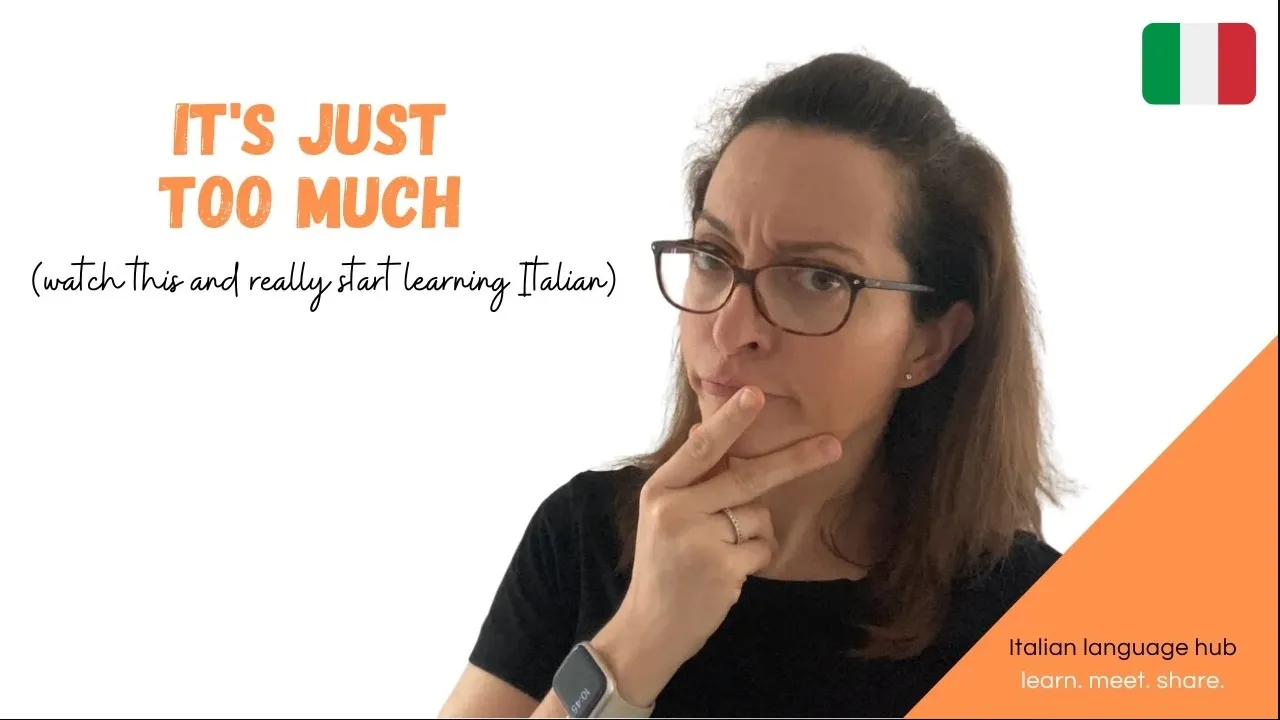Italianize Yourself
Full immersion on all that's Italian.
Fun Facts. Italian Culture. Language Insights.
Italian Irregular Nouns
Did you know that in Italian there are MANY IRREGULAR NOUNS? I know it's crazy and they drive students crazy all the time!
With this new video you can finally have a full overview of all the Italian words that do not follow the general rules when it comes to gender and number.
If you want to practice and level up your Italian I suggest that you also purchase the following book called Alma Edizioni - Grammatica Pratica della Lingua Italiana (Amazon affiliation link) and check out page 9! :)
Match my video lesson with the book and you will have a super fun Italian lesson!
Italian vocabulary fruits la frutta
In this article you will learn the names of some fruits and some simple sentences. In the video above, you can also listen to the pronunciation.
The twenty most common fruits and berries to know in Italian
Le albicocche - apricots
Le albicocche sono arancioni
- The apricots are orange
Le mele - apples
Una mela al giorno toglie il medico di torno
- An apple a day keeps the doctor away
Il melone - melon
Prosciutto e melone
- Ham and melon
La banana - banana
Le banane sono curve e gialle
- Bananas are yellow and curved
L’anguria - watermelon
L'anguria la mangio quando fa caldo
- I eat watermelon when it’s hot
Le pesce - peaches
Le pesche hanno molte vitamine
- The peaches have a lot of vitamins
Le prugne - plums
Le prugne sono viola
- The plums are purple
Le ciliegie - cherries
Le ciliegie spesso sono in coppia
- Cherries often come by twos
Le arance - oranges
Adoro bere la spremuta fatta con le arance
...Italian Plural Nouns
In the video above and in this article you will see a basic explanation of the rules that you need to learn on the change from singular to plural in Italian!
If you want to you can also download the full pdf version of the lesson here!.
These are the changes that you need to keep in mind when it comes to singular versus plural words in Italian
For masculine words
Masculine nouns that end with an O (in the singular form) will change the ending to an I (in the plural form)
Il libro - I libri
- the book - the books
Il ragazzo - I ragazzi
- the boy - the boys
Il gatto - I gatti
- the cat - the cats
There are also some masculine nouns that end with an A.
These are for example:
Il problema - I problemi
- the problem - the problems
Il poeta - I poeti
- The poet - the poets
Il programma - i programmi
- The program - the programs
For feminine words
Feminine nouns that end with an A (in the singular form) will change to an E (in the plural form...
How to Learn Italian... without loosing your mind!

Learning a language can be a difficult and stressful task. This quick guide has been created to help you find a healthy language journey style that will allow for you to build a habit that works for you and that will help you to level up your Italian.
Here are the key points to keep in mind... you can download this guide and the weekly planner by clicking on this link!
1. Learning a language takes time and commitment.
Learning Italian does not happen overnight. Do not be fooled by the "easy-full immersion courses" that tell you that you will reach fluency in a couple of months. Consider that as a child it probably took you at least 2 years to start saying your first words in your mother tongue language! Do not stress yourself thinking that learning Italian can be quick or easy.
2. Immerse yourself in the language.
The more you listen or read Italian the more you are going to pick-up the language in a soft stress-free way.
Some suggestions on how to immerse yourself...
Italian irregular verbs that end with "IRE"
In this video you will learn to correctly conjugate at the present tense 6 new irregular verbs in Italian!
There is a nice exercise at the end of the video! Do not miss out!
Here is a list of the new verbs that you can immediately use!
- Dire (to say)
- Morire (to die)
- Riuscire (to be able to)
- Salire (to go up - to climb)
- Uscire (to go out - to exit)
- Venire (to come)
Download here the review chart with the conjugation of the verbs!
Subscribe to my newsletter to receive all the free materials directly in your inbox! :) It's FREE! :)
Check out my YouTube channel for more videos and learn Italian with me!
Italian Irregular verbs that end with "ERE"
In this video you will learn to correctly conjugate at the present tense 6 new irregular verbs in Italian!
There is a nice exercise at the end of the video! Do not miss out!
Here is a list of the verbs that you can immediately use!
- Bere (to drink)
- Rimanere (to stay - to remain)
- Scegliere (to choose)
- Sedere (to sit)
- Tenere (to hold - to keep)
- Togliere (to remove)
Download here the review chart with the conjugation of the verbs!
Subscribe to my newsletter to receive all the free materials directly in your inbox! :) It's FREE! :)
Check out my YouTube channel for more videos and learn Italian with me!
Italian Irregular verbs that end with "ARE"
In this video I will talk about the Italian irregular verbs that belong to the "ARE" group. So you will learn the most commonly used Italian irregular verbs that end with -ARE.
If you like this video and you want more... check my free Italian start course here!
Take note that this is VIDEO 1 of a three video series where you will learn all the other irregular verbs.
Subscribe to my YouTube channel or to my newsletter to view the new videos as soon as the are out!
At the end of the video there are two exercises! Check them out and practice! If you need to review the lesson you can download for FREE a chart with all the verbs mentioned in the lesson. You can do that by clicking on this link here!
Here are all the verbs!
ANDARE (to go)
- io vado
- tu vai
- lui/ lei va
- noi andiamo
- voi andate
- loro vanno
Let’s use this verb in a sentence:
"Io vado in palestra tre volte a settimana" (I go to the gym three times a week)
Try to create a sentence with this verb! If you ...
The Italian Verbs Essere and Avere
This video might seam easy for many of you but for beginners it is important that these verbs are clearly understood from an early stage of their learning adventure.
Why do I say this? Well because you will need to use these verbs if you are creating basic sentences and you will not always use them in the same way as you do with those same verbs in English.
So what am I talking about? Well I’m talking about the verbs ESSERE (to be) and AVERE (to have) today we will conjugate them at the present tense.
Let’s see how they are conjugated:
The verb ESSERE
- Io sono
- tu sei
- lui / lei è
- noi siamo
- voi siete
- loro sono
Remember that when you are writing it out you absolutely need to remember to insert the accent when you are using the third person singular:
- lui / lei è
- lui è Marco
- lei è Maria
If you do not write the graphic accent you are not using a verb but you are using the conjunction e… which means AND:
- Marco e Maria… this would be MARCO and MARIA…
So be caref...
Learn 30 Italian adjectives that describe personality

In this video you will learn how to correctly use 30 Italian adjectives to describe a personality and character.
The video has a nice fun exercise at the end and you can also download the list of adjectives by clicking on the this link here.
Here are the adjectives (translations are in the video and in the free download)
Una persona è…
- simpatica ≠ antipatica
- felice ≠ triste
- ottimista ≠ pessimista
- pigra ≠ attiva
- estroversa ≠ introversa
- forte ≠ debole
- sicura ≠ insicura
- gentile ≠ sgarbata
- cortese ≠ scortese
- educata ≠ maleducata
- generosa ≠ avara
- altruista ≠ egoista
- buona ≠ cattiva
- sensibile ≠ insensibile
- socievole ≠ timida
Subscribe to my YouTube channel and find out all the free materials available. Sign-up to the newsletter and receive all the materials directly to your inbox!
Using Formal and Informal Speech in Italian
Today I want to talk about a simple concept that sometimes can be very hard for Italian language learners because it might be something that does not exist in your language… i’m talking about formal and informa speech.
What do I mean by that? Obviously also in English and in many other languages that do not grammatically distinguish between these two ways of speaking there are options that allow for you to be more or less formal, you might be able to use different words or maybe address people by their last name or calling them with Mr or Mrs. In Italian like in many other European languages like French and Spanish we use a specific verb conjugation form to express formality or informality.
Let me explain what I mean…
ok so you know that the subject pronouns in Italian are
- Io (I)
- Tu (You)
- Lui / lei (He / she)
- Noi (We)
- Voi (You)
- Loro (They)
In order to create the formal and informal versions of speech you need to focus on
- TU and on LEI
TU is the second person singul...


